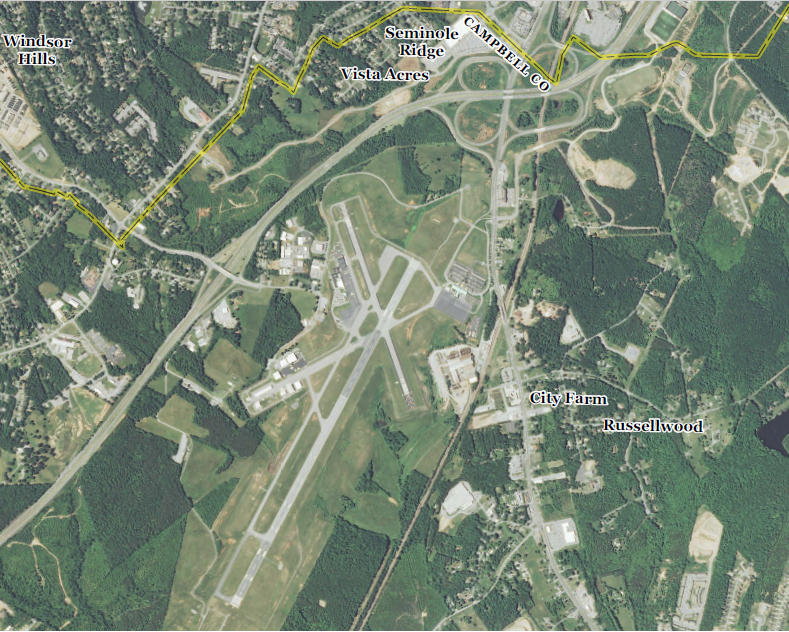
the Lynchburg Regional Airport is owned by the city, but located in Campbell County outside the city boundaries
Source: US Geological Survey (USGS), City Farm 7.5x7.5 topographic map (2013)

the Lynchburg Regional Airport is owned by the city, but located in Campbell County outside the city boundaries
Source: US Geological Survey (USGS), City Farm 7.5x7.5 topographic map (2013)
The commercial airport at Lynchburg, now known as Lynchburg Regional Airport, was constructed by the City of Lynchburg. It was built in Campbell County on a part of the City Prison Farm, where inmates raised vegetables and operated a dairy farm. Lynchburg has expanded its boundaries through annexations, but the city-owned airport has always been in Campbell County outside the city limits.
The airport opened in 1931 as Preston Glenn Field. The name honored Lt. Preston Glenn, a pilot in the Army Air Corps during World War I. The name reflects the time of construction. Had the airport been built after D-Day in World War II, it might have been named in honor of the soldiers in the 29th Division from Bedford who died on the beaches of Normandy.
Airport facilities were upgraded during World War II, when Lynchburg was a stop-over point for planes being ferried to Hampton Roads for shipment to Europe. In 1962, The Lynchburg City Council renamed the whole facility Lynchburg Municipal Airport to increase clarity about the location. Preston Glenn Field was retained as the name for a portion of the airport.
The current Air Carrier Terminal Building used by commercial airline passengers opened in 1992. Runway 4-22 was extended from 5,799 feet to a length of 7,100 feet in 2007. The second runway, Runway 17-35, is only 3,387 feet long.1
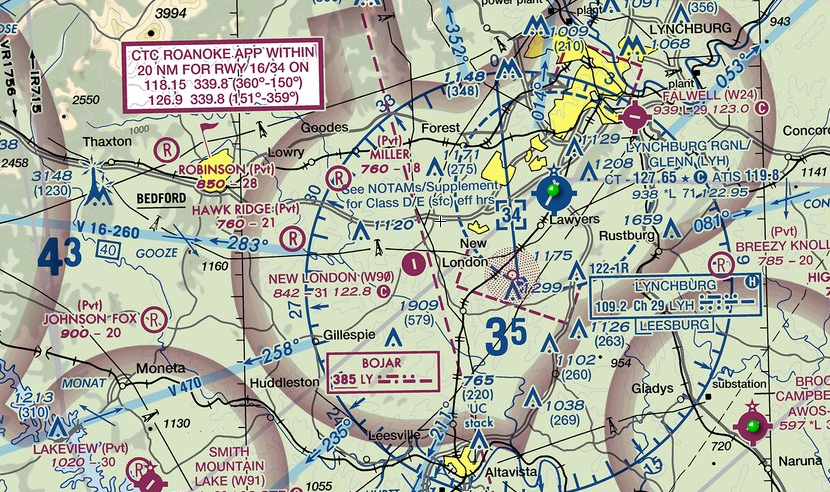
aeronautical chart for area including Lynchburg Regional Airport (LYH)
Source: SkyVector
In 1990 the Lynchburg City Council created the Regional Airport Commission to manage and operate the airport. The city council appointed all nine members; Campbell County had no official authority. Five members had to be citizens of the city, three appointees represented the Central Virginia region (the counties of Amherst, Bedford, Campbell and Appomattox), and the ninth member was the Lynchburg City Manager or that person's appointed representative. If no appointee representing the Central Virginia region was from Campbell County, then the Campbell County Administrator may serve or appoint someone as an ex officio non-voting member.
Lynchburg Regional Airport (LYH) was the last commercial service airport in Virginia to be managed by a municipal government rather than by an independent authority. In 2019, the Regional Airport Commission proposed to become an independent authority, requesting City County approval and a change in the operating license by the Federal Aviation Authority. The change was proposed to make management more efficient, and help the airport recruit more carriers or at least increase the number of destinations offered.
Conversion to management by an independent authority would make the airport a business rather than a department of the city. Nearby counties would be invited to join as members of the authority's board, unless the General Assembly modified state law requiring that airport authorities must have directors from multiple jurisdictions.2
The passenger traffic at the airport reflects the relatively low population in the Central Virginia region. The number of passengers using Lynchburg Regional Airport peaked in 1994, after airline deregulation increased competition. Lynchburg became a "spoke" providing passengers to hubs at Charlotte, Atlanta, Washington, and Pittsburgh. After the 2001 terrorist attacks, however, airline traffic declined and carriers reduced expenses.3
When United's regional carrier Atlantic Coast Airlines discontinued its Dulles-Lynchburg route in 2002, Lynchburg filed a formal objection to the decision with the US Department of Transportation. That Federal agency had authority to require continued operations or some form of compensation to ensure "Essential Air Service."
The airline responded that 60% of the passengers flying to Washington were traveling ultimately to other destinations. Lynchburg's remaining flights to hubs in Pittsburgh, Charlotte, and Atlanta would be adequate to service those customers. The 40% of customers headed just to DC could use the flights to Dulles from the nearby airport at Roanoke:4
The number of passengers declined almost 50% between 1998-2003, and US Airways stopped flying to Pittsburgh. The airport ended up with excess capacity.
The US Department of Transportation awarded Lynchburg a Small Community Air Service Development Program grant to attract a new carrier flying to DC and potentially Philadelphia, but the airport was unable to recruit a third airline to compete with US Airways and Delta. The Federal agency's "Start-Up Cost Offset" grant expired unused.5
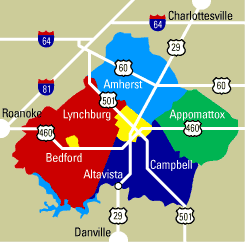
the Lynchburg Regional Airport is in the center of Region 2000, which ecourages economic development in Central Virginia
Source: Region 2000 Economic Development Council, Transportation
Traffic increased after 2007 when Delta chose to offer low-fare tickets at Lynchburg. After Delta abandoned its Lynchburg service in 2011, Lynchburg was left with just one company offering scheduled commercial passenger service. US Airways did increase the number of its flights.
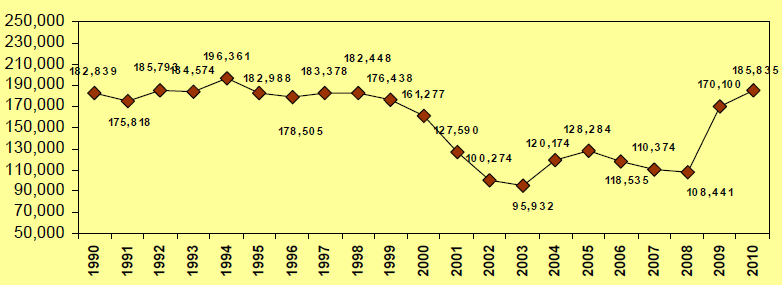
the number of passengers using Lynchburg Regional Airport (LYH) increased after Delta introduced low-cost fares in 2007 to compete with US Airways - but Delta abandoned the Lynchburg market in 2011
Source: Daily Airline Filings, Community Proposal - Lynchburg Regional Airport (2011)
After 2011, US Airways (which merged into American Airlines in 2015) offered flights only to its hub at Charlotte, North Carolina. A Lynchburg City Council Member complained:6
Another request for a Small Community Air Service Development Program grant was submitted in 2011 to get AirTran Airways to start service to Atlanta using Boeing 717 jets.
At the time, almost 25% of passengers were going from Lynchburg to Atlanta or an airport in Florida but had to travel through the Charlotte airport to reach their final destination. Lynchburg claimed that adding another carrier would increase rather than cannibalize business for the incumbent provider, US Airways. The grant application suggested US Airways would benefit, if AirTran started service and more passengers chose to fly from Lynchburg rather than nearby airports.
After Southwest Airlines purchased AirTran, the Boeing 717 jets were leased to Delta and the proposal for the Federal grant was no longer viable. Lynchburg then sought to amend it in order to make a different argument for Federal funding.7
The main constraint limiting Lynchburg's ability to expand service to additional destinations or to attract a competing airline is the small catchment area. Passengers choose which airport to use based on many criteria, but easy access to the airport is a major factor.
Potential passengers living east of Lynchburg can access the Richmond airport, which offers far more flights and destinations. For people living west of Lynchburg, US 460 offers easy access to the Roanoke airport. It is only a two hour drive to Piedmont Triad International Airport in Greensboro, NC, which has more options than Richmond or Roanoke.
The 2010 Master Plan for Lynchburg Regional Airport defined the Lynchburg Metropolitan Statistical Area (Amherst, Appomattox, Bedford, and Campbell counties plus the city of Lynchburg) as the airport's primary catchment area, with four surrounding counties (Prince Edward, Charlotte, Halifax, and Pittsylvania) as a secondary catchment area.
The boundaries of the secondary catchment area were based on the assumption that potential passengers living south of the James River would choose to drive to Lynchburg, rather than take US-360/US-29 to Greensboro or US-501 to Raleigh-Durham. The airport master plan explained:8
The airport noted in another document in 2011:9
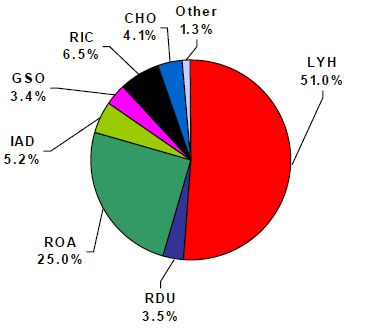
the primary competitor to the Lynchburg Regional Airport (LYH) is the Roanoke-Blacksburg Regional Airport (ROA), followed by Dulles (IAD) and the airports at Richmond (RIC), Charlottesville (CHO), Raleigh-Durham (RDU), and Greensboro (GSO)
Source: Daily Airline Filings, Community Proposal - Lynchburg Regional Airport (2011)
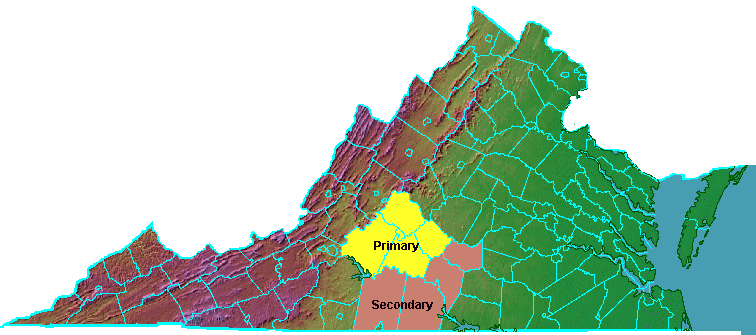
the primary and secondary catchment areas are the places where potential local travelers would consider Lynchburg Regional Airport (LYH) to be the closest commercial service airport
Map Source: Ray Sterner, Virginia - County Map
In 2019, the airport revealed that its latest passenger leakage study showed that in its core market (within 20 miles of Lynchburg), 75% of potential passengers were choosing to fly from other airports. 21% chose to fly from Raleigh-Durham International Airport and 9% from Roanoke Regional Airport. Other major competitors were to the north - Dulles International Airport, Baltimore/Washington International Thurgood Marshall Airport, and Reagan National Airport. The airport director hoped the analysis would help recruit United Express to offer service to Dulles again.10
Since there is no other airline offering any competition to American Airlines at Lynchburg, the carrier could charge monopoly prices. The low number of passengers could also cause that last airline to abandon the market. Lynchburg Regional Airport could end up like Danville Regional Airport after 1995, with no scheduled commercial air service.
Lynchburg managed to maintain service by American Airlines because the airline used it as an experiment. It offered six flights daily with low fares, and managed to feed enough passengers into the Charlotte hub to keep the Lynchburg route profitable. American added a seventh flight in 2019. With various changes in planes being used there were 65% more seats available than in 2017, but airport officials cautioned that local traffic had to fill 80-85% of the seats or the airline would reduce capacity.
Roanoke officials were frustrated by their competitor's success, because the low fares caused some passengers in the Roanoke area to drive west and fly out of Lynchburg Regional Airport.11
General aviation traffic is a significant part of the business at Lynchburg Regional Airport. In addition to hosting private planes and servicing charter flights, the airport also supports flight operations and aviation maintenance associated with Liberty University's School of Aeronautics. The main university campus is two miles away, but the Flight Training Facility, Flight Operations building and the Airport Academic Center are located at the airport.
Liberty University stated its aviation program in 2004, and grew it into the largest flight school in Virginia. The school purchased a charter aviation jet center and additional buildings. The university subsidiary, Freedom Aviation, operates a full-service Fixed Base Operator (FBO) facility that sells aviation gas and provides aircraft maintenance services.12
The Lynchburg Regional Airport Commission faced a choice in 2014 after Freedom Aviation bought the only competing FBO at the airport, Virginia Aviation. The Lynchburg Regional Airport Commission sought to maintain competition and recommended that the city operate its own FBO, in part to capture profits to offset previous city-funded subsidies for airport operations.
In 2015, the City Council chose to commit to just one FBO and expanded the authority of Freedom Aviation to service all types of aircraft landing at Lynchburg Regional Airport.13
That same year, Liberty University purchased the New London Airport in Bedford County, for use as a base for the university's School of Aeronautics.14
In 2025, Lynchburg attracted a second airline for the first time since 2011. United Express announced plans to offer daily service to Chicago O'Hare International Airport and Washington Dulles International Airport, providing direct service to three destinations.
The existing facilities at the terminal could accommodate 600 passengers daily, and the flights to just Charlotte had attracted less than 250 customers each day. Expansion by local businesses, especially Framatome (involved with nuclear reactors) and Delta Star (which made electrical power transformers and mobile substations), were an indicator that there was a reliable demand for business travel.
Airport officials estimated that the number of people flying from Lynchburg would increase from 30,000/year to 80,000/year, reducing the "leakage" of Lynchburg residents to other airports:15
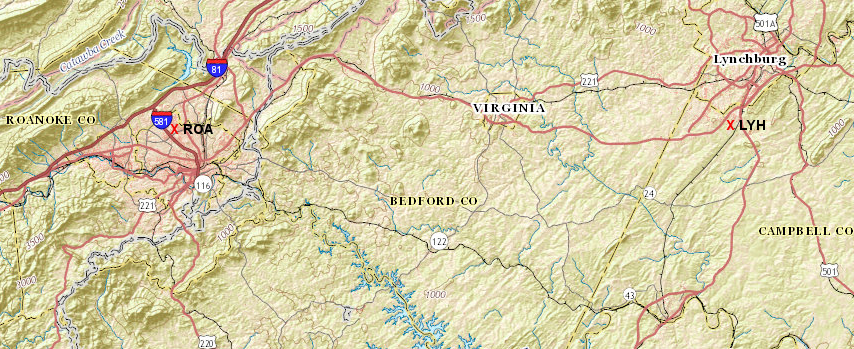
the Roanoke-Blacksburg Regional Airport (ROA) is one hour west of the Lynchburg Regional Airport (LYN), and offers service to more destinations
Source: ESRI, ArcGIS Online
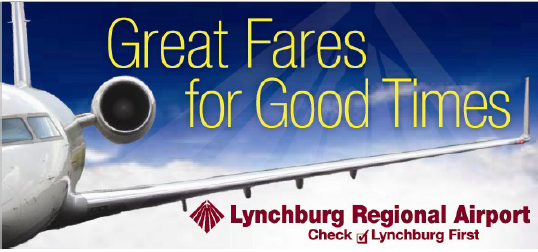
marketing for the Lynchburg Regional Airport has included the slogan "Check Lynchburg First"
Source: Community Proposal - Lynchburg Regional Airport grant application for US Department of Transportation Small Community Air Service Development Program (p.6)

the number of passengers getting on board or deplaning at Lynchburg peaked in 1994
Source: Federal Aviation Administration, Passenger Boarding (Enplanement) and All-Cargo Data for U.S. Airports